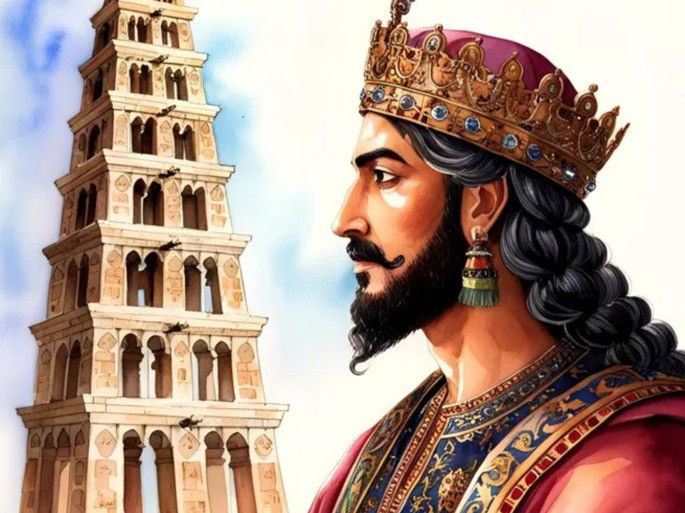Nimrod was a powerful king and hunter. He founded Babel and other cities. The Bible does not say that he married his mother or that he personally built the Tower of Babel, but it does link him to its founding. Nimrod is seen as a symbol of pride and rebellion against God. His story serves as a warning against excessive desire for power and human glory.
The son of Cush and great-grandson of Noah through Ham’s line, Nimrod stood out as the first great ruler on earth after the Flood. The Bible presents him as “the first mighty man on earth” and a “mighty hunter before the Lord,” indicating that he was an influential leader and founder of important kingdoms. The name Nimrod means “skillful hunter.”. Ironically, over a time, the name acquired a negative connotation and is now sometimes used to refer to a foolish person, perhaps reflecting the fact that Nimrod opposed God.
Through his reign, Nimrod founded the cities of Babel, Uruk, Akkad and Kalneh, in Shinar (Mesopotamia). He also expanded his dominion toward Assyria, where he built cities such as Nineveh. Although the Bible does not explicitly state that he built the Tower of Babel, many scholars associate Nimrod with its construction, since it was erected in Babel, the city he founded.

The Bible does not mention that Nimrod married his mother or had a child under those circumstances. That idea comes from non-biblical traditions, associated with apocryphal texts and writings of ancient authors, who linked Nimrod with the figure of Semiramis and the worship of Tammuz, which is not confirmed by the Bible.
The Bible does not address Nimrod’s death. Some Jewish traditions say that he was killed by Shem (Noah’s son) because of his idolatry and rebellion, but this is not recorded in the Bible.
Nimrod’s legacy in the Bible is that of a symbol of human power and pride that opposes God’s will. He represents humanity’s attempt to exalt itself by its own means and serves as a warning against spiritual arrogance.
Bible Study on Nimrod
Did Nimrod Build the Tower of Babel?
According to the Bible, the Tower of Babel was built in the land of Shinar, where the descendants of Noah united to build a city with a tower that would reach the heavens (Genesis 11:1–9). Their goal was to prevent the people from scattering across the earth and to achieve personal fame.
Although Nimrod’s name is not directly mentioned in that episode, Genesis 10:10 states that Babel was one of the cities he founded. The Bible suggests that the construction of the Tower of Babel was a collective decision. The tower’s construction is interpreted as an act of pride and rebellion against God, who then confused the people’s languages and scattered them across the earth.
There is no direct archaeological evidence that Nimrod built the Tower of Babel. However, ziggurats (step-pyramid towers) like those in Babylon are real structures that may have inspired the biblical account. Still, the details about the Tower of Babel and Nimrod’s involvement in its construction cannot be confirmed based solely on the biblical text.
Did Nimrod Marry His Mother, Semiramis?
The Bible does not say that Nimrod married his mother, Semiramis. This story is not found in Scripture and comes from later traditions and legends. The Bible mentions Nimrod in Genesis 10 as a mighty hunter and founder of cities such as Babel, but it does not discuss his wife or direct family.
Semiramis is not mentioned in the Bible. She appears in ancient stories and Babylonian myths, being linked to Nimrod as a wife or even mother, and to Tammuz as a son. Tammuz is briefly mentioned in Ezekiel 8:14 as a pagan deity mourned by Israelite women.
The association of the three (Nimrod, Semiramis, and Tammuz) comes from non-biblical sources, such as Babylonian traditions and interpretations by ancient writers. These stories have no biblical basis and are more symbolic than historical.
The Descendants of Nimrod
Nimrod was one of the first powerful leaders after the flood. He was the son of Cush, grandson of Ham, and great-grandson of Noah. His family lineage is significant, descending from Ham, one of Noah’s sons who was cursed by his father in a notable episode. Nevertheless, Ham’s descendants, especially Nimrod, rose to prominence.
Nimrod became a great leader and founded important cities such as Babel (Babylon), Uruk, Akkad and Kalneh, in the land of Shinar, which is modern-day Mesopotamia. He is also associated with the expansion into Assyria, helping to establish cities such as Nineveh and other historically significant locations.
His origin marks the beginning of human kingdoms and empires, and he is seen as a symbol of power and organization. However, the biblical tradition also associates this expansion with human arrogance and rebellion against God, especially in relation to Babel, which represents humanity’s attempt to reach the heavens without relying on the Creator.
The Death of Nimrod
The Bible does not recount how Nimrod died. Some Jewish traditions and extra-biblical sources suggest that Nimrod was killed by Shem, Noah’s son, because of his idolatry and rebellion against God.
Other legends associate his death with political conspiracies or religious conflicts. However, this information is not confirmed in Scripture.
Nimrod’s death remains shrouded in mystery, with his legacy most remembered as a symbol of pride and opposition to God’s will.
See also:
